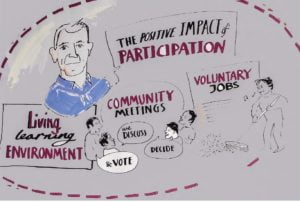Governors to design own incentives
This Monday (3 September 2018), the MoJ announded that prison governors are being consulted on a new approach to incentives “which encourages prisoners to take responsibility for their own rehabilitation”.
The consultation, which runs for 28 days, is, as far as I understand it, a semi-public exercise (involving governors, unions and third party stakeholders but not the general public) asking for views on prison governors being allowed to design their own programme of incentives tailored to the specific challenges in their prison.
There have always been incentive schemes in prisons – the different levels of living conditions from basic up – but this new approach and the language associated with it comes from Justice Secretary David Gauke’s time at the Department for Work and Pensions where the government introduced a range of sanctions on those receiving benefits.
The MoJ press release sets out the basic purpose:
Those who behave well and engage in meaningful activities such as education and employment programmes could receive privileges such as more time in the gym or additional visits.
Crucially, governors will be able to tackle poor behaviour by taking away privileges – returning people to a more basic regime and living conditions – and will have greater freedom to decide how prisoners move up or down privilege levels.
The new framework
The press release provides minimal detail on the proposed new incentives framework apart from stating that the new system will retain 3 privilege levels: basic, standard and enhanced, but remove ‘entry level’ which many consider inappropriately penalises prisoners who are new, setting up an adversarial relationship with staff from the outset.
The MoJ acknowledges that research on behaviour change shows positive reinforcement is much more effective at shaping behaviour than punishment and, while sometimes necessary, punishment alone does not effectively change behaviour. Nevertheless, the press release emphasises the sanctions element of the framework:
We will retain sensible limitations on governors’ freedoms, so that, for example, no paid for TV channels or other inappropriate incentives are permitted.
And for those who don’t follow the rules, a strict system of adjudications and punishments will ensure that governors are able to deal swiftly with those who refuse to engage. Punishments range from the removal of privileges to harsher measures such as prosecution and additional prison time.
The MoJ suggests that earned incentives could include such things as more time out of cell, more gym time and additional visits from families.
Conclusion
There is plenty of dissatisfaction with the operation of the current regime of earned levels of “privilege” and there is clear value in incentivising positive behaviour.
Nevertheless, the proposed new scheme raises a number of key issues which need to be addressed, preferably in a public setting:
- If governors are to operate their own incentives and sanctions schemes, does this mean a form of postcode lottery for prisoner conditions? Should prison inspectors be charged specifically with looking at how fair and appropriate local schemes are?
- Incentives schemes can only operate effectively in prisons which are running well in the first place — if I can’t get my regular shower or time out of cell that I’m entitled to, then asking me to earn other privileges is likely to be perceived as adding insult to injury.
- There is real danger in using such basic human needs and rights as family visits as incentives.
- Where prisons are operating under pressure (as many, including almost all locals are), it often becomes the norm that staff look to enforce discipline by actively looking for infractions of rules, rather than encouraging compliance and positive behaviour. We need public information on the ratio between incentives and sanctions and the opportunity to link different frameworks with prison safety statistics.






